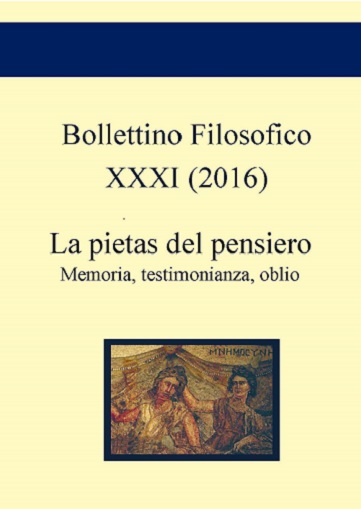The original position and the rationality of Primo Levi’s shame
Abstract
Contrary to what he expected, Primo Levi didn’t experience his life after being released from Auschwitz as cheerful and light-hearted. He – like many other survivors – was haunted by an obscure and solid anguish that he finally identified as springing from a sense of shame or guilt in front of those who were exterminated in the Lager. Levi was unable to either acknowledge his shame as rational or reject it as irrational. This looks, though, like a rather unstable situation calling for some further elucidation. I will thus examine Levi’s shame in light of the dominant conception of practical deliberation and, more specifically, in view of the the role that John Rawls ascribes to the original position. Firstly, I will stress how Rawls’ use of the original position as a representational device to the determine the principles of justice relies a certain assumption (i.e., the Matching Assumption) that Levi’s experience calls into question and, secondly, I will identify two assumptions (i.e, The Control Assumption and The Third-Party Assumption) that are constitutive of Rawls’ conception of rationality and such that they may account for Levi’s reluctance to acknowledge the rationality of his shame. Once these constraints are brought out, I will argue that Levi’s experience provides serious reason to call them into question inasmuch as it invites the existence of a fundamental asymmetry between the first- and the third-person perspectives (sec. 3-5). I will thus conclude that Primo Levi could coherently have regarded his blame as rational, even though no third party is in a position to blame him. This challenge to the primacy of the third-person perspective will provide, in turn, an additional argument against Rawls’ original position and the dominant conception of practical deliberation.Downloads
Bollettino Filosofico pubblica in internet, ad accesso aperto, con licenza:
|
|
CCPL Creative Commons Attribution |
L'autore conserva il copyright sul suo contributo, consentendo tuttavia a chiunque "di riprodurre, distribuire, comunicare al pubblico, esporre in pubblico, rappresentare, eseguire e recitare l'opera", purché siano correttamente citati l'autore e il titolo della rivista. L’autore, al momento della proposta di pubblicazione, è inoltre tenuto a dichiarare che il contenuto e l’organizzazione dell’opera è originale e non compromette in alcun modo i diritti di terzi, né gli obblighi connessi alla salvaguardia di diritti morali ed economici di altri autori o di altri aventi diritto, sia per testi, immagini, foto, tabelle, sia per altre parti di cui il contributo può essere composto. L’autore dichiara altresì di essere a conoscenza delle sanzioni previste dal codice penale e dalle leggi speciali per l’ipotesi di falsità in atti ed uso di atti falsi, e che pertanto Bollettino Filosofico è esente da qualsiasi responsabilità di qualsivoglia natura, civile, amministrativa o penale, e sarà dall'autore tenuta indenne da qualsiasi richiesta o rivendicazione da parte di terzi.
